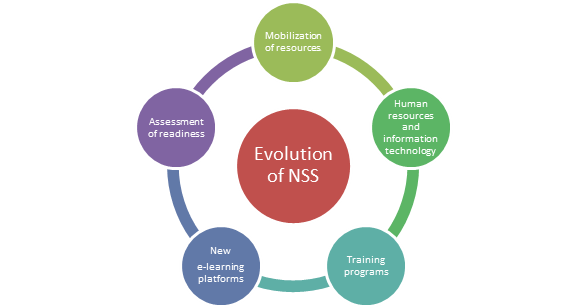Coordination challenges within the National Statistical Systems of developing countries
At the conclusion of the first UN World Data Forum in Cape Town next month, the High-level Group for partnership, coordination and capacity-building for statistics for the 2030 Agenda for sustainable development (HLG) is planning to present a Global Action Plan for Data which highlights, among other challenges, that "Effective planning, follow-up and review of the implementation of the 2030 Agenda for Sustainable Development requires the collection, processing, analysis and dissemination of an unprecedented amount of data and statistics at local, national, regional and global levels and by multiple stakeholders."
National statistical systems face the challenge of adapting to and developing within a changing environment, in order to achieve the full implementation of the 2030 Agenda. This is particularly the case in developing countries, where statistical capacity building is crucial for government policy leaders and the international community, and needs to strike a balance between the implementation of the 2030 Agenda and national priorities for sustainable development. On the other hand, the national statistical systems of developing countries have today a unique opportunity to align their national statistical planning and implementation processes with the sustainable development agenda, as their modernization and strengthening efforts consider the implementation and coordination process at all global, regional, national and sub-national levels.
In in order to assess the availability and quality of sectoral data needed for SDG indicators to follow-up and review the 2030 Agenda, National Statistical Offices of developing countries must take into account the specificities of their own statistical production systems. Also, capacity building and technical assistance from international, regional and national organizations (which include technical cooperation, training and sharing of best practices) need to consider not only current national statistical capacities, but also the availability of resources in the long term. Another important challenge is the establishment of improved coordination mechanisms--and the continuous review of their effectiveness-- for collecting, sharing, and communicating sustainable development data and statistics across national, regional and international statistical systems.
In Argentina, as in many developing countries, a transformative agenda for national statistical systems calls for the revision of statistical laws and regulatory frameworks to make them fully consistent with the Fundamental Principles of Official Statistics, to incorporate relevant and appropriate open data initiatives, and to facilitate data integration and automation of data exchange. And to make all this possible, developing countries need financial, human and institutional capacities in their entire data ecosystem, which include national statistical offices, the private sector, international organizations and the UN system, civil society, and the scientific and academic communities. This is another aspect of the "leaving no one behind" principle enshrined in the 2030 Agenda.
The evolution of national statistical systems through SDG implementation
The coordination challenges of SDG implementation, as described above, include the integration of the SDG framework in national sectoral programmes and planning mechanisms, the strengthening of national statistical systems, and the coordinating and leadership role of national statistical offices. But developing countries need something more to enable the transformation and integration of statistics across the national statistical system. They need new institutional agreements and governance schemes, the revision of statistical laws and regulatory frameworks, and the establishment of specialized organizational units within national statistical offices responsible of dealing with "cross-cutting services" (e.g., methodological development, quality assurance, data collection and dissemination, etc.).

The implementation of the SDGs is a clear opportunity for the transformation and modernization of national statistical systems, based on the development of capabilities and the mobilization of resources. This process should include, in parallel, the assessment of the institutional, organizational and technical readiness of national statistical systems to move to the next level of maturity; the leverage of existing, and establishment of new, e-learning platforms; the implementation of training programs on change management and innovative technology and standards for collection, processing and dissemination; the pooling of human resources and information technology within and across national statistical systems; and the development of criteria and mechanisms to set priorities for the mobilization of resources.
